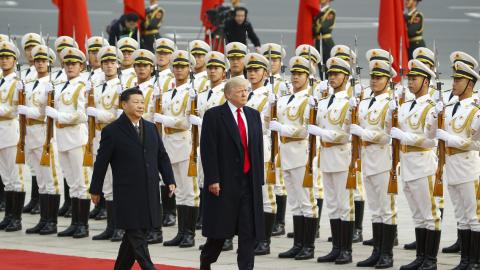As the Biden interregnum concluded, the Trump train roared into Washington this week with the vigor and triumphant vindication unseen since 1829, when Andrew Jackson stormed into the White House after a similarly decisive electoral victory over what he believed to be a stolen election of 1824 by John Quincy Adams.
Mr. Jackson, our seventh president, became a transformative national leader, ushering in the Golden Age of American democracy — aptly known as Jacksonian Democracy — an era that Alexis de Tocqueville, the immortal French observer, admired for its democratic ideals.
Similarly, Donald Trump, our 45th and 47th president, has proved himself a transformative and consequential leader. However, whether his second term will consolidate or undermine his prior legacy depends largely on whether he can defeat the single greatest existential threat to American democracy: the Chinese Communist Party (CCP). This democracy, inherited from the Founding Fathers and expanded by Andrew Jackson, is under siege, and Mr. Trump’s resolve to confront this threat is a critical challenge ahead.
A crucial aspect of this victory plan over the CCP is ending the world’s misguided illusion of neutrality — particularly the notion that nations can remain impartial between the United States and China. Fortunately, we have already witnessed President Trump’s determination to challenge geopolitical opportunism, as evidenced by his bold demands for Panama to return control of the Panama Canal (now under Chinese interests) and his desire to acquire Greenland, a strategic chokepoint coveted by Beijing. The rationale behind ending global neutrality between the U.S. and China is profound, vital and indispensable for free nations’ future.
First, neutrality is, in essence, a form of complicity. The claim that a nation can remain “neutral” overlooks the fundamental reality that neutrality inherently aligns with one of the competing sides — often the wrong one. In this context, failing to stand with the United States — a nation that, despite its flaws, represents liberal democratic values — only strengthens China’s authoritarian ambitions.
Beijing thrives on ambiguity, exploiting divisions among smaller states to exert influence, particularly in regions like Southeast Asia and Africa. A neutral stance effectively emboldens China, signaling tacit approval for its actions, including human rights abuses, military expansion in the South China Sea and efforts to undermine international norms.
Second, neutrality is often disguised as pragmatism. Advocates argue that nonalignment allows countries to extract benefits from both sides of a geopolitical divide. However, this argument neglects the dangers of overdependence on China. Many countries that once embraced neutrality have now realigned themselves with the United States for their self-interest. Far from remaining indifferent, these nations have recognized the long-term risks of kowtowing to Chinese demands.
Third, neutrality proponents often cite the irresistible allure of Chinese markets for foreign goods and investment. This is a dangerous myth. While China’s market has long been portrayed as an untapped gold mine of opportunity, the reality is far more sobering. The Chinese market is heavily regulated and rife with barriers to entry, such as stringent licensing requirements, forced technology transfers, and opaque legal systems that disadvantage foreign companies.
Consumer spending in China has significantly decreased, and when Chinese consumers do make purchases, they increasingly favor domestic products, especially technology and consumer goods, thus eroding the competitive edge of foreign firms. Moreover, government policies often favor domestic industries through subsidies and protectionist measures, undermining the profitability of foreign investments. Intellectual property theft continues unabated, further undermining the long-term viability of foreign enterprises. These factors paint a grim picture of China’s market as far less accommodating and profitable than its promoters have claimed.
In stark contrast, the United States economy has experienced a robust rebound, largely because of such institutional strengths as private entrepreneurship, property rights and free market competition. While China grapples with economic setbacks such as colossal real estate collapses, plummeting stock markets and diminishing foreign trade, the U.S. economy has continued to prosper. The U.S. has overtaken China as the top trade partner of several key global players, including Japan, Germany, South Korea, the ASEAN nations and Taiwan, a trend that continues to grow. Blind optimism about China’s future is misguided and ultimately suicidal.
Fourth, neutrality endangers national security and sovereignty. China’s aggressive behavior, including its incursions into the South China Sea and coercive tactics toward Taiwan, highlights its blatant disregard for the sovereignty of other nations. Neutral countries, especially those close to China, such as Southeast Asian ones, risk becoming pawns in Beijing’s expansionist agenda. These nations inadvertently signal vulnerability by failing to choose a side, potentially inviting further aggression or even territorial encroachment.
Finally, there is a moral imperative to choosing sides beyond strategic and economic considerations.
The United States, despite its historical shortcomings, promotes ideals of freedom, democracy and human rights. In contrast, China’s record is a litany of systemic oppression, from the abuse of Uyghur Muslims to the suppression of free speech and the imposition of authoritarian control over its citizens. Remaining neutral in this ideological struggle is morally indefensible, suggesting indifference to the fundamental values that undergird free societies.
All in all, the world must abandon the illusion of neutrality. As we move forward, the United States, under President Trump’s leadership, must galvanize global support against the Chinese Communist Party, ensuring that we stand with the forces of democracy, liberty and human rights. It’s time to board the Trump train and reject the false promises of alignment with a regime that embodies the very antithesis of those values. Only by doing so can we preserve the democratic legacy passed down by our Founding Fathers and expanded by the likes of Andrew Jackson.















